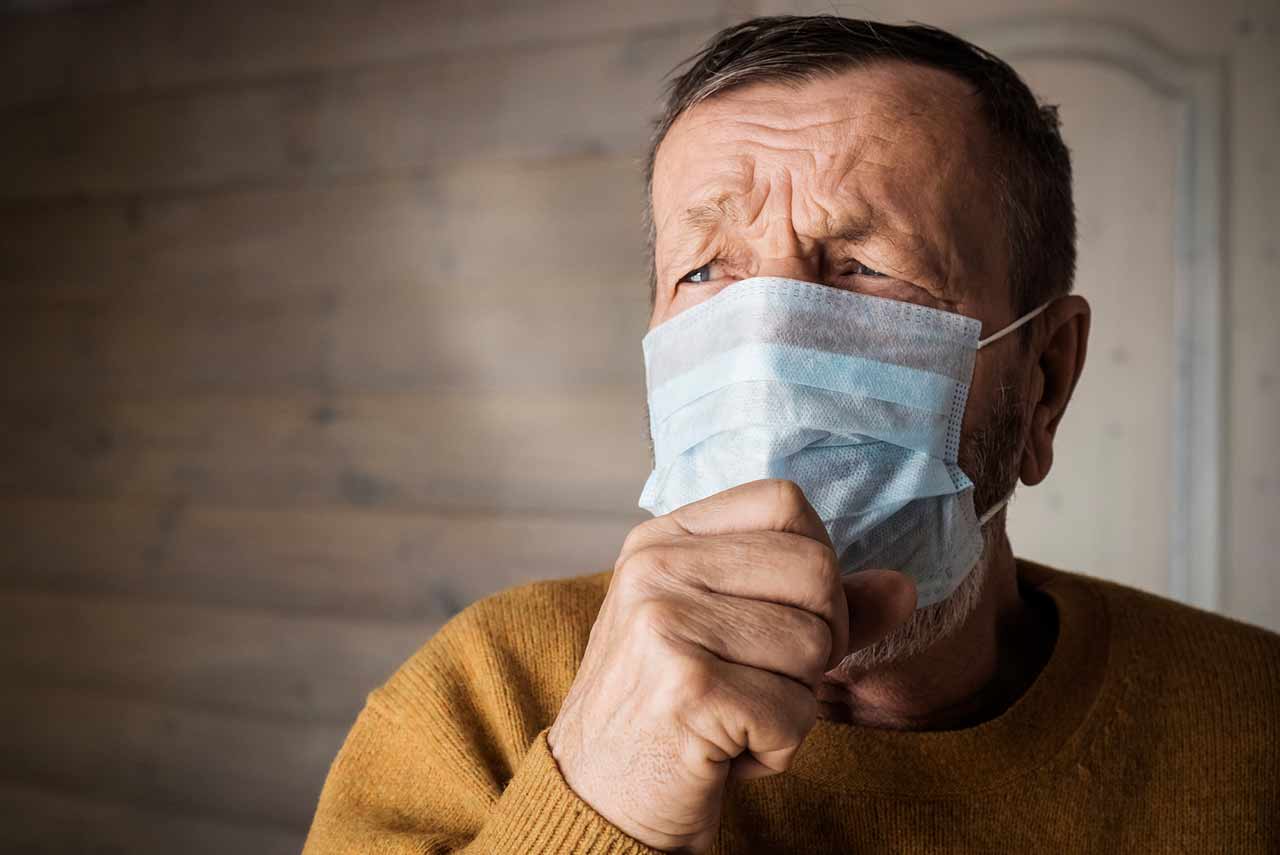
Many illnesses can cause a dry cough, including common colds. But for people with a history of asbestos exposure, a cough may be a sign of mesothelioma. Pleural mesothelioma is caused by asbestos and can develop decades after exposure. Symptoms include coughing and shortness of breath.
Because of its vague symptoms, doctors may misdiagnose pleural mesothelioma. So patients should share any history of asbestos exposure with their doctors. This may speed the process of determining the true cause of the cough. And for mesothelioma patients, earlier diagnosis may come with a more favorable prognosis.
What Is a Dry Cough?
A dry cough is a non-productive cough, meaning it does not produce phlegm or mucus. In general, coughing is a reflex triggered by the body to keep airways clear. It is a common symptom of many different conditions.
An occasional dry cough is normal and may be due to asthma, allergies or the common cold. However, persistent and frequent coughing could be a sign of a more serious illness. If a patient’s cough lasts longer than 8 weeks, it is chronic.
People usually experience a dry cough with minor illnesses. But a chronic dry cough can be a sign of other serious diseases, like mesothelioma. Asbestos is the only known cause of mesothelioma—and usually causes it decades later. So if you have a dry cough and a history of asbestos exposure, you may want to talk to your doctor and seek additional testing.
Mesothelioma & Dry Cough
Pleural mesothelioma develops after asbestos fibers embed in the lining of the lungs (the pleura). Over time, asbestos irritates the pleura and causes it to thicken, putting pressure on the lungs. This pressure can cause a dry cough, shortness of breath and chest pain.
A dry cough may be the first noticeable sign of mesothelioma, but patients can experience it at any stage of mesothelioma. As the cancer progresses, the cough may become more aggressive and painful. Tumor growth and other mesothelioma symptoms can also cause coughing.
In later mesothelioma stages, tumor growth can put pressure on the lungs and damage nerves. This can lead to a frequent dry cough. Pleural mesothelioma can also cause pleural effusion and pneumonia. Both can induce a dry cough.
Patients with peritoneal mesothelioma typically don’t develop a dry cough. This may change if the cancer metastasizes (spreads) into the chest cavity.
Dry Cough as a Side Effect of Mesothelioma Treatment
Mesothelioma tumors can cause a dry cough, but so can some mesothelioma treatments. For example, radiation therapy may cause a dry cough.
Patients who undergo mesothelioma surgery may also risk a recurring cough. Some individuals can develop infections as a result of aggressive surgery. Dry cough can be a secondary symptom of these infections.
Other Causes of Dry Cough
Dry cough is not unique to mesothelioma. There are many illnesses that may produce frequent coughing. Additional causes of dry cough include:
- ACE inhibitors
- Allergies
- Asthma
- Bronchitis
- COVID-19
- Idiopathic pulmonary fibrosis
- Lung cancer
- Pneumonia
- Postnasal drip
- Smoking
- Upper respiratory infection
It’s important to acknowledge dry cough as a common symptom of COVID-19. People who develop a cough alongside shortness of breath, fever, fatigue and/or loss of taste or smell should get tested for COVID-19. A complete list of coronavirus symptoms is available on the Centers for Disease Control and Prevention (CDC) website.
Cancer patients are especially vulnerable to coronavirus symptoms and complications. Mesothelioma patients should take additional precautions against COVID-19 exposure.
Treating Mesothelioma-Related Dry Cough
Medications and treatments are available to relieve mesothelioma-related dry cough. By undergoing treatment, mesothelioma patients can improve their quality of life.
Dry cough treatment may vary based on the root cause of a patient’s cough. Treatment options include over-the-counter and prescription medication, surgery, palliative therapy, environmental adjustments and home remedies.
Cough Suppressants and Other Medications
Prescription and over-the-counter medications can help suppress a recurring dry cough. These medications include steroids, Robitussin® (dextromethorphan) or an inhaler. Patients should consult their mesothelioma doctor about the best medication for their diagnosis.
Surgery
Mesothelioma doctors perform surgery to remove cancerous tumors. These surgeries help reduce pressure on the lungs. Surgery may relieve patient symptoms, such as coughing and shortness of breath.
Palliative Therapy
Some palliative treatments may also relieve coughing by reducing pressure on the lungs. Procedures like pleurocentesis and pleurodesis drain fluid buildup around the lungs to ease symptoms.
Environmental Considerations
Environmental factors may also influence a patient’s ability to breathe. Poorly ventilated or heavily polluted areas may trigger coughing. Mesothelioma patients should avoid cigarette smoke and other lung irritants.
The Importance of Early Detection
Earlier diagnosis of mesothelioma can improve a patient’s prognosis. If you have a dry cough and a history of asbestos exposure, talk to your doctor. It may help improve life expectancy and quality of life.
- The Renal Warrior Project. Join Now
- Source: https://www.mesothelioma.com/blog/dry-cough-mesothelioma/
